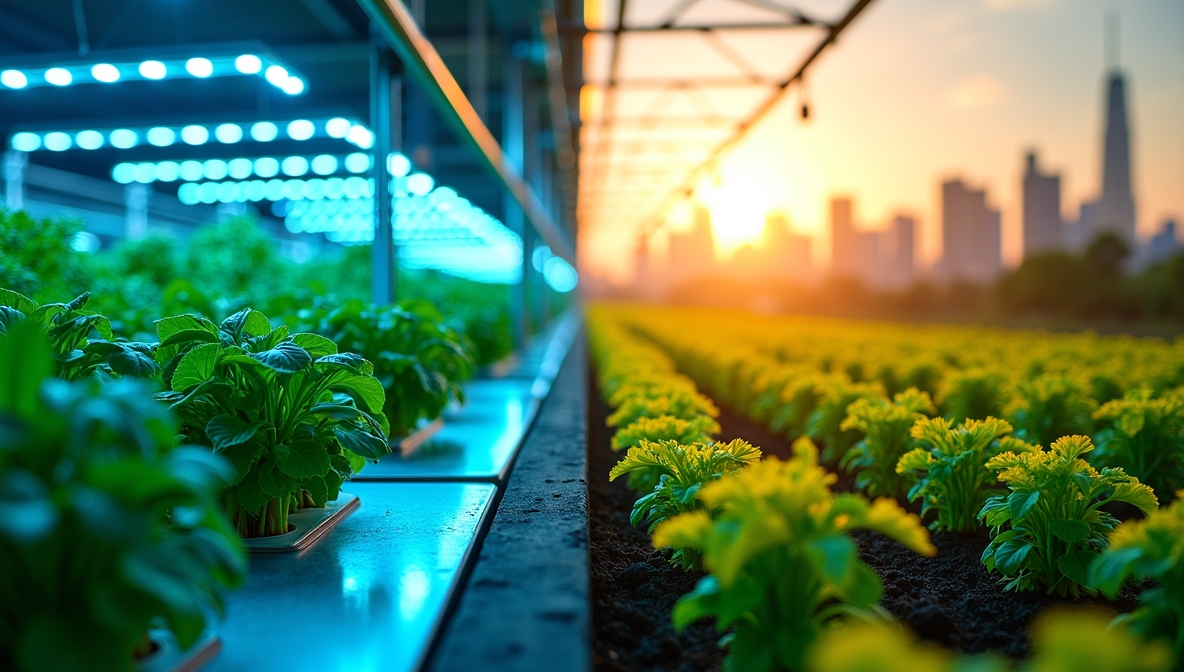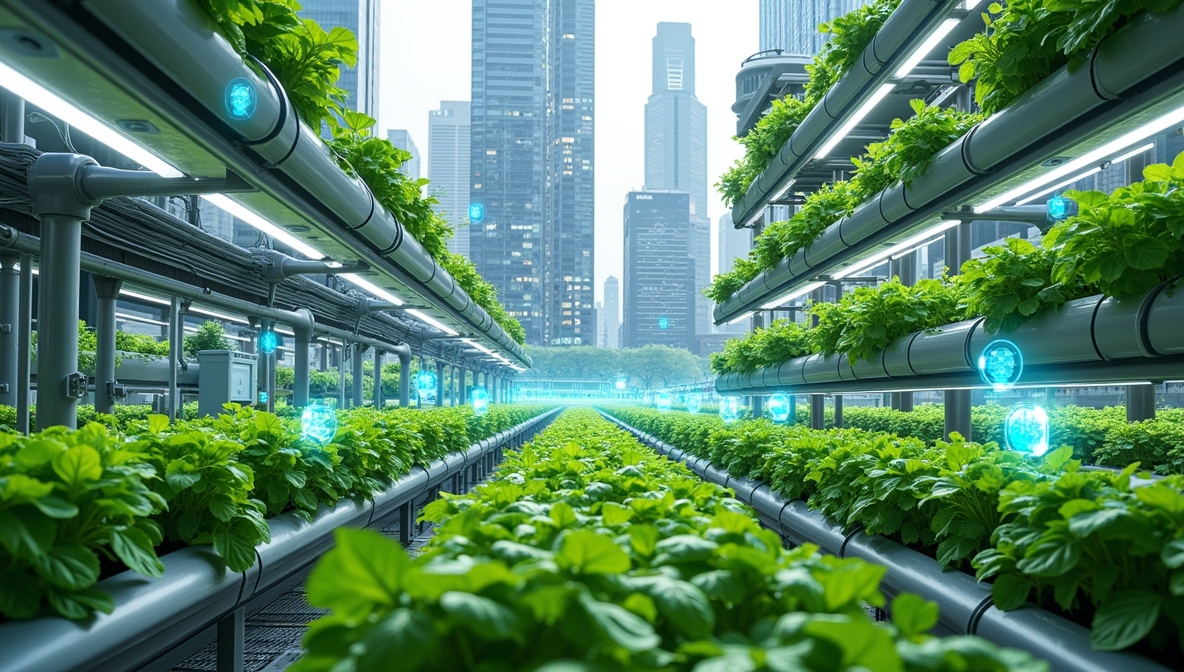Discover how hydroponic urban farming reduces water usage by 90%, promotes sustainable practices, and enhances produce quality in city living.
Introduction: The Future of Urban Agriculture
Imagine stepping into your apartment and picking fresh, organic vegetables from your very own indoor garden. Hydroponics, a revolutionary method of cultivation that utilizes nutrient-rich water instead of soil, is transforming urban agriculture. As cities grow and the demand for sustainable food sources rises, hydroponics presents a viable solution for health-conscious consumers and eco-friendly advocates alike.
In this article, we will explore the numerous benefits of hydroponic urban farming, comparing it to traditional farming methods. We will discuss resource efficiency, environmental impact, economic viability, and the future of this innovative agricultural approach.

1. The Water-Wise Farming Solution in Hydroponics
Water scarcity is a critical global issue, and traditional farming methods contribute significantly to this problem. Hydroponic systems offer an impressive solution by reducing water consumption by up to 90% compared to conventional agriculture. This is achieved through a closed-loop system where water is recirculated, minimizing waste and maximizing efficiency.
By utilizing vertical farming techniques, urban farmers can stack multiple growing layers, maximizing yield even in limited spaces. This innovative use of space not only ensures food security but also transforms rooftops and balconies into lush gardens.

Copyright: ©IWMI / Faseeh Shams
External Link: FAO Water Efficiency Report
2. Environmental Impact of Hydroponic Urban Farming
Hydroponics significantly mitigates environmental issues commonly associated with traditional farming. By eliminating soil from the cultivation process, hydroponic systems reduce chemical runoff, a major contributor to water pollution. Localized food production shortens supply chains, leading to lower carbon footprints.
Research from the USDA and various environmental agencies highlights the positive ecological impact of hydroponics. With controlled environments, the reliance on pesticides is minimized, resulting in cleaner, healthier food options for consumers.
Learn more at: USDA Sustainable Agriculture Programs
3. Economic Viability of Hydroponic Systems
While the initial investment in hydroponic systems may be higher than traditional farming methods, the long-term economic benefits are significant. Urban farmers can enjoy reduced labor costs, lower water bills, and efficient use of space, leading to considerable savings over time.
Additionally, the ability to sell locally grown, pesticide-free produce allows farmers to command premium prices, enhancing profitability. Numerous case studies illustrate how automated hydroponic systems have successfully increased efficiency and profit margins.
4. Freshness Redefined: Quality of Produce in Hydroponics
Hydroponics excels in producing high-quality, nutrient-dense vegetables. By controlling every aspect of the growing environment—light, temperature, pH, and nutrient levels—hydroponics ensures optimal conditions for plant growth. This results in fresher produce with extended shelf lives, making it a favorite among health-conscious consumers.
For those interested in starting their hydroponic journey, numerous resources are available, including step-by-step tutorials on monitoring essential factors like pH and nutrient levels.
Check out Example Tutorial: “Build an Automated Hydroponic System”
5. Embracing Technology: The Future of Hydroponic Urban Farming
The integration of AI, IoT, and advanced automation systems is revolutionizing urban agriculture. With innovations in real-time data analytics and smart sensor technology, managing a hydroponic garden is becoming increasingly intuitive. Home gardeners can now monitor their plants’ needs remotely, making it easier than ever to cultivate fresh produce.

Conclusion: A Path Forward in Sustainable Farming
Hydroponic urban farming is more than just a method of growing food; it’s a transformative approach that has the potential to reshape our understanding of agriculture in cities. With impressive resource efficiency, reduced environmental impact, and economic advantages, hydroponics meets the needs of today’s health-conscious consumers.
As we navigate the challenges of modern living, embracing hydroponics offers a sustainable solution that nourishes our bodies and fosters a deeper connection to our environment. Whether you’re a seasoned gardener or a curious beginner, now is the time to explore the possibilities of hydroponics and contribute to a more sustainable future.
FAQ
Q1: What is hydroponic urban farming?
A1: Hydroponic urban farming is a soil-less cultivation method that uses nutrient-rich water to grow plants in controlled environments, making it ideal for urban settings.
Q2: How much water can I save with hydroponics compared to traditional farming?
A2: Hydroponic systems can save up to 90% of water typically used in traditional farming.
Q3: Are vegetables grown hydroponically more nutritious?
A3: Yes, the controlled conditions in hydroponics help maximize nutrient retention and significantly reduce pesticide exposure.
Q4: Is it feasible for beginners to manage a hydroponic system?
A4: Definitely! Many modern hydroponic systems come equipped with automated monitoring features and user-friendly interfaces, making them accessible for anyone.
References
- FAO Water Efficiency Report: https://www.fao.org/sustainable-development-goals-data-portal/data/indicators/641-change-in-water-use-efficiency-over-time/en
- USDA Sustainable Agriculture Programs: https://www.nifa.usda.gov/grants/programs/sustainable-agriculture-programs
- Nutrient Dynamics in Hydroponics: https://www.sciencedirect.com/science/article/abs/pii/S0044848697001683
- Build an Automated Hydroponic System: https://www.youtube.com/watch?v=nyqykZK2Ev4
- Wikipedia – Hydroponics: https://en.wikipedia.org/wiki/Hydroponics
By Richard Peiheng Zhu
Urban farming / Hydroponics Expert / Content creator / Serial Entrepreneur / Member of Mensa Sweden / Member of Swedish Association of Inventors (SUF)